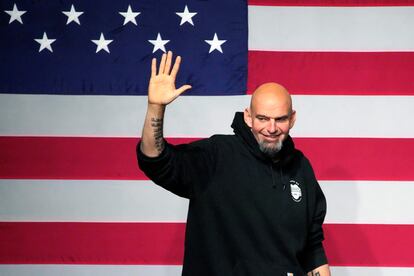John Fetterman says he thought news about his depression treatment would end his political career
The US senator acknowledges having ‘dark conversations’ about harming himself before he hit ‘the emergency brake’ and sought treatment for depression

Sen. John Fetterman acknowledges having “dark conversations” about harming himself before he hit “the emergency brake” and sought treatment for depression.
He remembers thinking about his three school-age kids. “I can’t be a blueprint for my children. I can’t let them be left alone or not to understand why he would have done that,” the first-term Pennsylvania Democrat told NBC’s “Meet the Press” in a deeply personal and introspective interview taped before the broadcast that aired Sunday.
So he checked himself into Walter Reed National Military Medical Center in Bethesda, Maryland, last Feb. 15. “There was nowhere else to go,” he said, describing how he often felt during his stay that “there wasn’t any hope sometimes and like, ‘What do I have left?’”
He also wondered whether he would survive politically.
“When it got released where I was and where it was going, it was a big story. And so, I had assumed that that would be the end of my career,” he said.
When he sought treatment for clinical depression, Fetterman was still coping with the effects of the stroke he had in May 2022, during his campaign for one of the Senate’s most contested seats. “My heart technically stopped, and it was a very touch-and-go situation,” said Fetterman, 54. A pacemaker was implanted with a defibrillator to manage two heart conditions, atrial fibrillation and cardiomyopathy.
His victory over Republican Mehmet Oz had helped Democrats keep control of the Senate and made him a national figure. It was the height of his political career. But he couldn’t make it out of bed at his home in Braddock, in western Pennsylvania.
“I really scared my kids, and they thought, ‘You won, Dad. Why aren’t we enough? Why are you still so sad? Why are you even more sad?’ And it was hard for — to explain why I was. And, of course, a 9-year-old child wouldn’t understand that. And it was awful,” Fetterman said.
So much so that he said he “pleaded not to go down to D.C.” later that November for orientation sessions in Washington for newly elected lawmakers.
His favorite holiday was nearing, yet he was unable to think about getting Christmas presents for his children and “dreading” his swearing in on Capitol Hill early in the new year.
Within two months, he was at Walter Reed. Aides had described the new senator as being withdrawn and uninterested in eating, discussing work or the usual banter with staff.
“This is a conversation that I’ve had with myself and anybody that knows they’re unable to address their depression, is they start to have dark conversations with themself about self-harm,” Fetterman said. “And things continued to kind of tick off the list. And then I kind of hit the emergency brake.”
He added, “I knew I needed help.”
Before checking into Walter Reed, Fetterman had never publicly discussed his battle with depression. He has since said that he has experienced it on and off throughout his life.
He left Walter Reed at the end of March after six weeks of inpatient treatment with his depression “in remission,” according to a statement from his office.
Doctors describe “remission” as when a patient responds to treatment so that they have returned to normal social function and they are indistinguishable from someone who has never had depression.
Fetterman has since become a visible presence in the Capitol, bantering with reporters, joking with Senate colleagues and speaking up at Senate hearings.
To others who are now “facing a really dark holiday time,” Fetterman offered this guidance: “I know that last year’s was desolate. And this year’s might be desolate. Next year’s can be the best ever. And that’s what happened for me.”
Sign up for our weekly newsletter to get more English-language news coverage from EL PAÍS USA Edition
Tu suscripción se está usando en otro dispositivo
¿Quieres añadir otro usuario a tu suscripción?
Si continúas leyendo en este dispositivo, no se podrá leer en el otro.
FlechaTu suscripción se está usando en otro dispositivo y solo puedes acceder a EL PAÍS desde un dispositivo a la vez.
Si quieres compartir tu cuenta, cambia tu suscripción a la modalidad Premium, así podrás añadir otro usuario. Cada uno accederá con su propia cuenta de email, lo que os permitirá personalizar vuestra experiencia en EL PAÍS.
¿Tienes una suscripción de empresa? Accede aquí para contratar más cuentas.
En el caso de no saber quién está usando tu cuenta, te recomendamos cambiar tu contraseña aquí.
Si decides continuar compartiendo tu cuenta, este mensaje se mostrará en tu dispositivo y en el de la otra persona que está usando tu cuenta de forma indefinida, afectando a tu experiencia de lectura. Puedes consultar aquí los términos y condiciones de la suscripción digital.








































